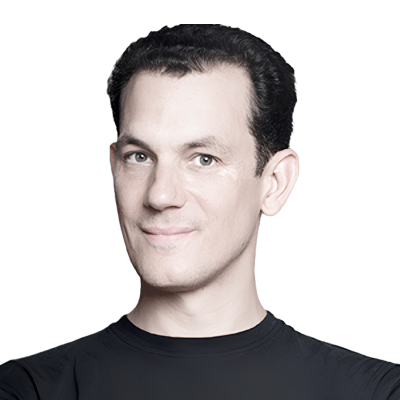

Emeric Ernoult
CEO at Agorapulse
In SaaS, You Have to Build a Tool That Users Need on a Daily Basis
Emeric Ernoult is the co-founder and CEO of Agorapulse, a social media management tool aiming to be in the Top 3 social media SaaS products in the world for SMBs.
He’s been through 12 years of failure, according to his words until he and his co-founder Ben finally founded Agorapusle in 2012. As he says, he’s “a dinosaur of SaaS”.
Emeric likes to talk straight, he’s French after all, he doesn’t believe in quick wins and he has learned how to manage a company.
In this interview, you’ll learn:
– Why, in SaaS, you have to be aiming to be the tool that someone needs on a daily basis to do their job;
– What’s the basis of a strong experimentation culture
– What they learned from A/B testing Facebook ads
– Where and how he would spend $1,000 on social media advertising
– Why having a simple pricing page would convert much better than “trying to reinvent the wheel” with fancy UX tweaks
– Why he didn’t inject money in the product, after raising a healthy VC funding round in 2019.
Check out our other episodes.
Transcript
Please note this transcript is automated
00:01 Desi Emeric Ernoult is a lawyer turned entrepreneur who has been through 12 years of failures (according to his words) until he finally founded the social media management platform Agorapulse. They raised a healthy funding round last year and are currently a team of 90 people. Emeric likes to talk straight, he’s French after all, he doesn’t believe in quick wins and he has learned how to manage a company. Here’s what he’s got to share.
00:44 Desi Hi Emeric, welcome to The Product Show.
00:48 Emeric Ernoult Hi! Happy to be happy here, thanks for inviting me.
00:50 Desi Of course. Okay, so tell us about Agorapulse, tell us your story and how did you get here
00:55 Emeric Ernoult That’s a very long story, so I’m gonna give you the nutshell story the one minute – Yes, please! I used to be a business lawyer for 5 years and then I started my first business in 2000 with my co-founder at the time and still my co-founder now, Ben, who is our CTO July of 2000. We’ve always been in SaaS, we’ve always been in social media, It used to be called Communities, before it was called social media. I forgot the name, it became SaaS in 2010 an ASP – application service provider is what it used to be called, I’m a dinosaur of SaaS! My co-founder Ben and I, we have failed trying to get a successful business between 2000 – 2012. That’s 12 years of failure. It was pretty long and painful, but at the end of the day that let us to start Agorapulse late 2011 – early 2012. It was not a success in the early days, because we didn’t raise money, we’re fully bootstrapped. We were a very small team, 5-6 people until probably 2015. It was a small team for a long time when you don’t have money you do with what you have and you’d better hope that your team is amazing because it’s very small. We got to profitability at the end of 2015 reaching a 100k MRR, we’ve been profitable since then. It’s been 5 years. We’re now at 12 million euros ARR. We have 89 people in the team, half of them are in France the other half are all across the world and among the all over the world, 50% are in the US. So that’s the team that’s the revenue, that’s the painful story. We’re aiming to be among the top 3 social media management tools in the world self-serviced, not enterprise, we’re not going after the Fortune 500. We’re going after the high end of the SMB market and low end of the mid markets, that’s our target. And we want to be the best social media management tool, the highest quality, the best user experience you could have for the best price.
03:36 Desi Did you start with the same idea? How did you navigate through the changes?
03:39 Emeric Ernoult We haven’t done one pivot, we have done tens of them.
03:43 Desi What was the biggest one? Was there a mistake that you release this is not gonna work.
03:51 Emeric Ernoult I don’t think you should look at pivot like mistake, you should look at pivot. Were they the right ones? Did you do them fast enough? Did you take the right learnings into consideration? Let me talk you through the latest one we’ve done cause I think that’s the most interesting one. We started Agorapulse as a social media software that was supposed to interact with Facebook. Facebook was the only social network we started to work with in 2012. Before Agorapusle we had another software that was supposed to help brands to build their own networks. That didn’t work out. It was super painful. Very hard… People kept telling us “we don’t want to build our own social networks we want to be on Facebook”. And that’s why we started building something on Facebook, instead of trying to go against Facebook. But the whole fashion at the time was contests and promotions, quizzes, photo contests, sweepstakes, that kind of stuff. It was the craziness in 2011-2012, everybody wanted one. It’s funny enough nobody wants that anymore quite crazy… Our tool at the time was doing several things on Facebook, but that was the one tool we were known for and the one thing we were making thing with. But very early on in the first 12 months, my co-founder and I realized how bad that business model was, because the churn was really really high and the retention was really really poor, as a consequence or vice versa. We knew that that wouldn’t give us a sustainable business and we realized we don’t wanna be a tool that people are using once a year or once in a lifetime, or twice a year at best. We want to be the tool that people use on a daily basis. That’s the goal, because the only way you can build a sustainable business – you’re solving a pain every single day. And that’s how we pivoted from doing contests and promotions on Facebook to doing the whole range of social media management services adding Twitter, Instagram and Linked and all the other social networks, because Facebook alone was not enough. And going well beyond contests and promotions, and eventually killing them and doing publishing. Engaging, monitoring & listening, and reporting. That was a very long, difficult pivot to make, because there was a lot of work but it let us to having a sustainable business as we have now and it was the best pivot that we’ve ever made!
06:27 Desi I think what’s really interesting about your product is that it’s a product that relies on other products and some of the biggest players obviously like Facebook, Instagram, Twitter. How do you keep up to date and up to their speed with the changes they’re constantly introducing. Instagram, for example, introduced reels TikTok is massive and I can imagine this is a huge development exercise there how do you manage to keep up to date?
06:55 Emeric Ernoult Yes, first of all, keep in mind that everything they release is not in their APIs. So Instagram Reels, they’re not in their APIs so we can’t do anything with Instagram Reel. You want to play with Instagram Reels? Go on Instagram natively and play with them, you’re not gonna be able to play with them using a tool. There’re a lot of features they’re developing that are not going into their API, because they’re too young or too niche or not really tremendously useful for businesses, and our target is businesses, not individuals. How do we keep up with the changes of those APIs what comes in, what goes out, because sometimes you remove things from the API. Sometimes they add new things. Well, it’s hard. I’m not gonna fake it – it’s difficult, it takes a lot of time I think the maintenance of our connectors for the various social media APIs. It’s probably sucking 20% of our engineers time. That’s probably around that, so that’s a lot – 15 to 20%. But you have to do it, as otherwise you die one of the prices to pay to work on someone else’s ecosystem you have to constantly adapt to their ecosystem and adjust, and update your software, so it’s up to date with their own. Every business comes with its pros and cons, easy parts and tough pars the tough parts of working on social media is you have to deal with the APIs and they’re always disappointing. But you know, before we built a tool on top of Facebook, Instagram Linked and Twitter and all the social networks. We tried to build up our own thing and we failed. So at the end of the day it’s tough, there’s a price to pay, but we make money. We have a business, we have 87 people, so there’s always a price to pay! I’ve seen businesses come and go in various industries. They all had a price to pay, each and everyone of them.
08:56 Desi Of course, and they’re the same limitations for all your competitors
09:00 Emeric Ernoult Yes, absolutely!
09:03 Desi Which is your hottest feature? Which is your most popular feature that you consider your biggest competitive advantage?
09:12 Emeric Ernoult The one that I love the most is our Inbox feature I think our Inbox is the best on the market. If you have an active social media presence and people keep throwing comments, reviews and private messages at you all day long. Our system is simply the best to be organize in a very efficient way, very fast, very quickly. We save replies, with bots automated responses… We’ve made it super easy for people with large volume of incoming content to handle as a team. We have clients that have 160 people responding to various profiles that they have the one that I’m thinking is a leading ecommerce site in Thailand. So that is absolutely where we’re the best and the one thing that we have and nobody has. We handle and manage comments on Facebook ads you can’t do that without using Agorapulse. And frankly I’m telling you, if you do ads and let people troll your ads in the comments results are gonna drop! We did a research on that by having one ad with no comments, one ad with positive comments and one ad with negative comments and we let them run with $500 each. The one with negative comments had a very low click-through rate, because people looked at the comments and they didn’t click. The one with no comments and positive comments were actually the same which was funny, but they had 3 times the CTR of the one with negative comments. So don’t let your ads being ruined by people pooping in the comments
10:58 Desi How do you identify opportunities for growth, especially for building new features Do you have a process or a system that you follow, or you mainly follow your gut instinct?
11:10 Emeric Ernoult Never follow your gut instinct! It’s the worse thing you could do! You can follow your gut instinct for the first iteration of your product but even there but even there it’s a very risky proposition. You need to talk to your customers. You need to do customer discovery as much as you can, all the time. Early on it’s the founder doing that and obviously when you grow hopefully you have a project manager and a product team, and it’s the product team doing that you need to talk to customers and constantly do that. You need to have a system to gather all those feedback and requests to rate them, to score them, so when you make a decision, you make the best possible educated decision what to build next.
11:52 Desi And in terms of Acquisition – what would be your ideal strategy? Do you rely on your sales team or is it mainly product-led?
12:03 Emeric Ernoult It’s mainly product-led, because we’re self-service. We’re targeting the SMBs. The product is free trial then you try it, you like it, you subscribe. That’s probably how we get 80-85% of our clients. But we do have a sales team, because you have to adapt to how people want to discover you and want to be convinced. Some people want to talk to a sales team. They want to have someone to talk to, they want to ask questions. They want to be reassured that what you have is what they need, and if you don’t offer that they would not chose your tool. So you have to offer that, it’s important. The more they pay, the more they expect that, so it’s really important. You have built a few free tools which are so much fun to play with.
12:50 Desi Are they a strong part of your acquisition funnel?
12:58 Emeric Ernoult They’re useful, because they’re a flywheel, i.e. They’re very little maintenance behind them – once you launch them and you get them listed and back-linked in the right places they’re gonna send you a flow of leads and you don’t have to to do any work. But there’s a bet every single time you build a free tool. Sometimes it works really well and it works for years. We have Facebook Page Barometer. We built it at the end of 2012. We’re 2020, it’s been 8 years and it still bringing 2,000 leads a month. It’s incredible! But some others have required a lot of work… But you know, as you grow you wanna do it right. You get UI & UX involved, you get product involved it’s a lot of work, it takes energy, and then sometimes you build something you invest a lot of energy and the result is disappointing. So I’d say It’s a good strategy, but it’s not a sure-fire, there’s no silver bullet.
14:00 Desi You mention you UX, UI and Product team. Have you ever done a small UX tweak or maybe introduced a tiny feature that had a disproportionately high impact on the product, considering the effort it required? Did you have a small thing that turned to be a massive win? – No, no!
14:22 Emeric Ernoult I wish it was that easy but no. It’s usually a lot of small tweaks that eventually get you results. But on the other hand, one thing we did and I advise not to do is we did something that was unusual. That people were not used to and it was a very bad idea, because people were not used to it, so didn’t understand it was a blocker in subscribing. What we did instead of having a pricing page that says 49.99 or 199, we had a scroll bar where you say how many users you need how many profiles you need and so on, and then it would give you the price. You couldn’t see the price upfront that says – ok, how much is it? And that was really bad. When we switched back to a more regular pricing page – 99, 199, this is all you get. Conversions skyrocketed. So don’t try to reinvent the wheel if you don’t have to or if it’s not gonna create tremendous value.
15:28 Desi Can you share one of your biggest product mistakes and what did you learn from it?
15:33 Emeric Ernoult Product mistake – I’d go back to… I don’t think it’s a product mistake cause it’s what it got us started, but it’s building a business contest and promotions that was one-time usage, not something that people use on a regular basis. You want to be the tool of record of someone in the company. You want to be the tool that someone in the company, in the business is using every day for their job. You don’t want to be the funky thing that they’re gonna use from time to time because it’s funny. You don’t wanna be an image resizing tool, you don’t want to build that it’s a stupid example because a lot of tools do that as a small feature. You wanna be something that is necessary for someone to do his or her job on a daily basis.
16:15 Desi I watched a video of you at conference a couple of years ago where you said that you’re not interested in VC money, or at least that’s how it sounded. It seems you changed your mind last year – what was the reason for that?
16:27 Emeric Ernoult It’s very simple! I still believe you shouldn’t go for VC money, if you can start business without raising money it’s better, because it’s hard! And it’s very random and chances are 99% of the listeners are never gonna raise any VC money. So if you want to business and you want to raise VC money that makes you have 1% chance of success, I don’t like that. That’s not what I want, I want to control my success. The reason we raised money in 2019 is because we got approached by a business banker who said: “You need to sell your company the market is amazing, valuations are crazy high, you need to sell, you need to sell and become millionaires”. And we didn’t wanna do that I especially didn’t wanna do that because I enjoy what I’m doing and I thought there was so much left for me to learn and for the company to grow into. So we decided that we don’t wanna sell, but then my mentors. Who I respect very much said: “We understand your choice it makes sense, but it would be stupid not to take money off the table, so you should do a round but use that round to take money off the table, not to inject money in the company” So that’s what we did we got investors coming in and they bought back the two business angels who had been with us for like, one of them 20 years and the other one 10 years. It was about time that we got them an exit and my co-founder and I got a little bit of money, so I’m 48, I can buy a house now, never bought anything, I don’t own anything under my name, now I’ll be able to own something, so it was actually a sound advice to not stay all invested into the stock of the company, but to diversify a little bit and have some of my own real estate which at my age makes sense.
18:25 Desi OK, so you’re the social media specialist. Let’s imagine I’m a startup founder of a b2C startup and I’ve got 1,000 (£, EUR, or $) per month for social media advertising. Where would you advise me to spend my money? I know it’s a very generic question, it’s a very broad question, but I’m curious – Where do you think I’d see the biggest return of my money?
18:54 Emeric Ernoult Retargeting the page on your website that’s the closest to the end of the funnel that’s usually the pricing page.
19:01 Desi Would that be on Facebook or Instagram?
19:04 Emeric Ernoult Yes, Facebook, it doesn’t matter. Those are the people who visited the last page they visited before they convert so they’re warm, warm, warm – you wanna make sure that if one of them gets lost – you catch them back!
19:19 Desi An in terms of network – do you have preferences which one is converting best?
19:26 Emeric Ernoult No, not really! You know. That’s funny – I’m not an expert in social media anymore, I’m an expert in in running companies. When you get to a point when you have a close to 100 employees, you don’t do the business of your business. You do the business of running that business, so whatever you do whatever product you have, you should become less and less an expert of your product and you should have hired people that are much better than you are to experts at that. That’s what I think I did.
19:57 Desi And things on social change so fast, so you cannot really keep up to date if you’re not the social media manager on a day to day basis. How do you spend your time as a founder? How much of your time is spend on the product and how much of it is spent on the business and recruiting people?
20:15 Emeric Ernoult 0% on the product 50% on the people and the teams hiring, coaching, training, aligning, etc And 50% on strategy & vision and how we’re gonna get to the next step.
20:35 Desi Can you recall the results from an interesting growth experiment that you ran internally if you were involved in it, of course?
20:44 Emeric Ernoult At the end of the day, beyond that cause I think that a very specific technical answer to that question is not really interesting. What’s interesting is the logic you do when you wanna do those growth efforts. What you need to do and too few people do is really understand how people got to you, how people found you and where they go to hear about you. So how your ideal customer would discover you? You have to figure out where you need to be for those people to discover you and go and check your website, and of course you have to have a good website, with good copy and have your ideal customer well defined this is for them, you wanna have good design and good signup flow and so on. First and foremost, you need to make sure that the web is a big place and people go on the web to search for what they need and you need to make sure that people who search for the thing that you offer. How do they search for it? Where do they go? Who do they ask? What kind of review sites do they consult? So all that stuff! You need to map that! And once you’ve mapped that you need to look. Where am I? Am I present or not present? Am I visible or invisible? Where’s my competition? Who do I stack against them? And then you build the plan to be visible there as much as you can. That’s the best growth experiment you can do and very few people think that way. It’s crazy!
22:18 Desi What’s the one business or product metric you start your day with?
22:24 Emeric Ernoult Net new MRR
22:28 Desi – Straight to the point! Thank you so much for your time, Emeric, it’s been a pleasure! Wishing you all the best with Agorapulse
22:33 Emeric Ernoult You’re very welcome! Good luck to you, too! And good luck to the listener, as well!









